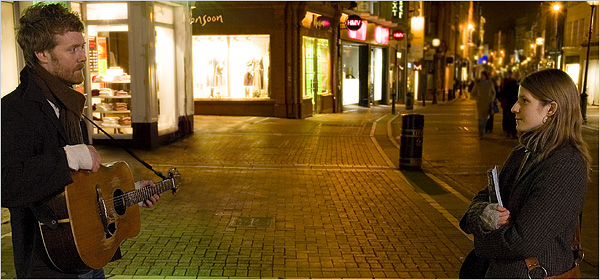Robert here w/ the secone season finale of Distant Relatives, exploring the connections between one classic and one contemporary film.

Hollywood has a pretty un-nuanced idea of infidelity. Whether cheating is bad usually depends on whether or not it's our protagnist who's doing it. If they are, then their current spouse is probably evil or terrible or unsympathetic and totally worth cheating on especially when the lover in question is most likely a soulmate of some sort to our protagonist. The details may differ but the situation is always perfect for drama. What our two films this week, which are tellingly not from Hollywood but across the pond, have in common is that both are more interested in the subtleties of infidelity than the overdramatics.
One place where our films differ is in the genders of our heroes. Brief Encounter is the story of Laura, a British houswife with an unextraordinary existence who meets a charming doctor named Alec Harvey and slowly begins to fall for him as he does for her. Once follows a pretty typical street musician (unnamed in the film, credited as "Guy") who dreams of something greater and begins to collaborate with and develop feelings for an immigrant girl (credited only as "Girl") and she for him. But despite this gender difference between the two films, they are vastly similar.
For starters, among all this talk of infidelity, neither couple actually consummates their relationships. Instead, these films are more interested in the process of falling in love, and how there are few impediments to love appearing but many impediments to it being actualized. There are no dramatic declarations or emotional explosions in either of these films. There are no evil spouses to abandon or uncontrollable passions to supress. Love is not presented as a fantastical fairy tale and our characters are not impossibly beautiful. These are both stories about the lives of real people. In both cases the conflict comes from our characters' abilities to give in to or fight their own feelings. In a way we root for them to do both.
But as films filled with an undercurrent of sadness at love that can never be realized, these aren't particularly sad films. In neither film are our characters' existances miserable, just ordinary, just devoid of excitement. And for both Laura and Guy we get the sense that even though their sadness is palpable maybe their lives are better for having known love just for a brief moment.

Here the films diverge a bit more again. A relationship develops between "guy" and "girl" in Once that involves being both musicians and muses, that isn't present in the more pensive Brief Encounter. But the desire in both to portray an honest relationship is what stands out. Both films were lovingly recieved as stand outs among their often more artificial bretherin. Although it may be a sign of the times that Once, despite its tale of musical dreams coming true, feels even more authentic when compared to its romatic contemporaries than Brief Encounter to the often similarly stoic British films of the time.
Either way, these films present love and romance in a way that doesn't necessarily appeal to a mass audience, as something full of difficulty and often frustration, not because of the chaos it creates but because sometimes it demands we resist it, and sometimes it's right.
